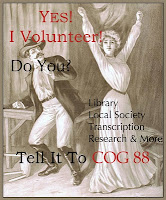
When the topic for the
88th Carnival of Genealogy was announced I faced a bit of a dilemma. At first I was pleased because volunteerism is a subject I could easily write about on a society blog - and that isn't always the case. But then it dawned on me that every article published here is at its essence about volunteerism. The California Genealogical Society is 100% a volunteer organization. We have no paid employees so everything we do is by definition an act of volunteerism. What new insights did I really have to offer on a subject I've been writing about for over two years? I decided to forgo this edition of the COG.
Obviously something happened to change my mind (literally at the eleventh hour). Photographs have become an integral part of the story I tell for the society so I tend to keep my camera in my bag and I always take a few shots on every visit to the CGS Library. Tonight as I was uploading I noticed that I had a few photographs taken on Tuesday, January 5, 2010 and I remembered how crowded it was that day in the library.
Pub/Mark Committee Meeting
The Publications and Marketing Committee meets on the first Tuesday of every month and there are usually six or seven of us who attend. The number varies depending on what else is going on in our lives. This month our chair, Cathy Paris, was there, along with Jane Hufft, Nancy Peterson, Marianne Frey, Arlene Miles and a new comer to our group - Henry Snyder. Unfortunately, Marilyn Willats had to leave before Jane Lindsey took this photograph. I remember thinking at the time how wonderful it was that Marilyn had been able to come in for the meeting. Marilyn cares for her grandchildren on Tuesdays so she can rarely make it anymore but on that day she didn't have her family responsibility. On her one free Tuesday she came to the library for a committee meeting.
Judge Project Meeting
Meeting in the next room were the members of the Research and Lookups Committee. These days they are consumed with the Judge Project. Laura Spurrier, Lavinia Schwarz, Pat Smith, Judy Bodycote, Lorna Wallace and Nancy Peterson were discussing formatting and footnotes and all manner of other things for the book they are researching and writing. I really need to write a blog article about the hundreds of hours they are logging and the amazing story they will tell but I dare not bother them for details with deadlines looming.
Others were there who were not photographed. Verne Deubler was at his computer processing emails and working on his newest indexing project. Dick Rees was handling the mail. Sandy Fryer and Paul Mayer were meeting which means that QuickBooks was open and they were probably closing the books on 2009 and readying things for the upcoming Annual Business Meeting.
Gaye Lenahan, Lorna Jones and Steve Harris were working in the library that Tuesday as well, bringing the total number of volunteers in the library to 21. Twenty-one members showed up on the first Tuesday of the year when the library was still technically closed for the holidays.
There was no speaker to hear, no personal research being done. Twenty-one members were there and the place was buzzing with activity and every moment was a selfless act of volunteerism to benefit a non-profit genealogical society. Now that was something to write about.
Written for the
88th Carnival of Genealogy - Volunteerism. The
COG poster provided courtesy of the
footnoteMaven.
Photographs by Kathryn M. Doyle, Oakland, California, January 5, 2010.












